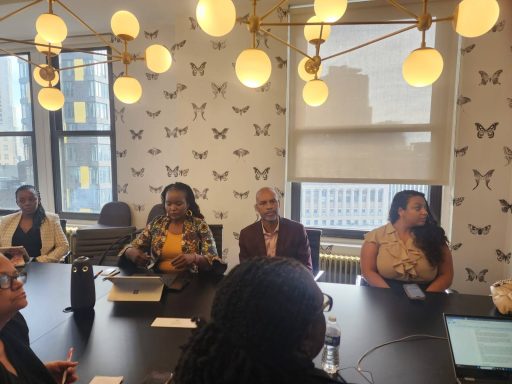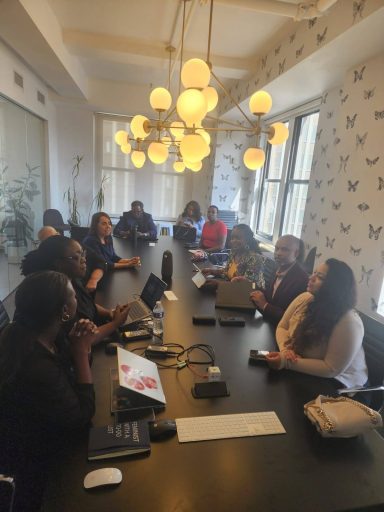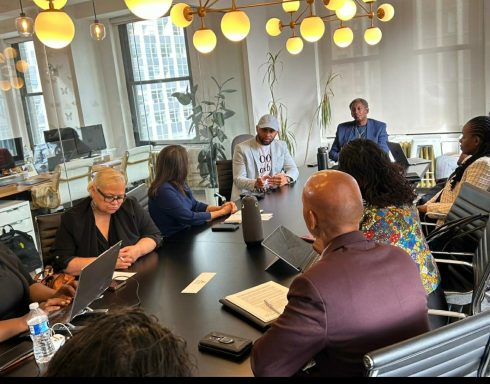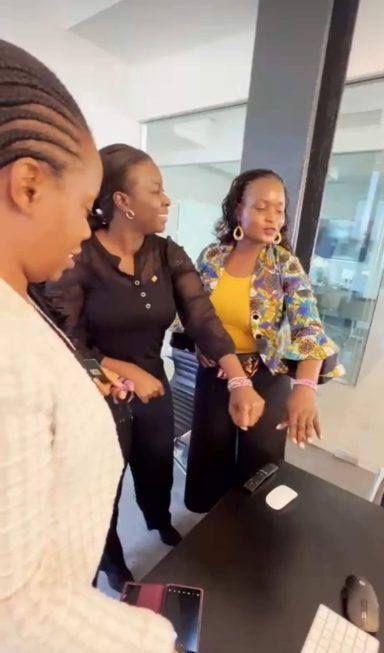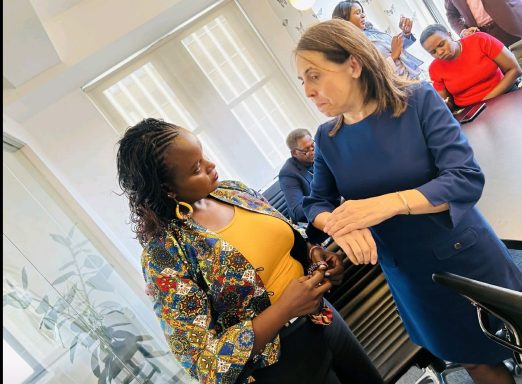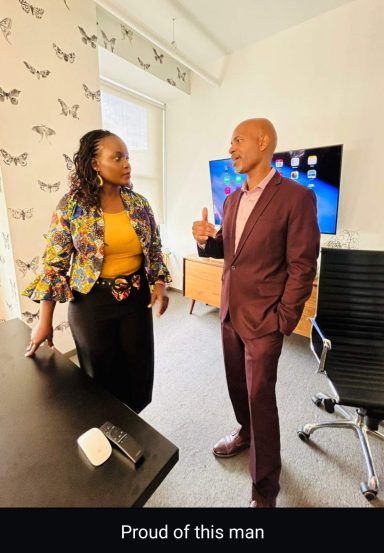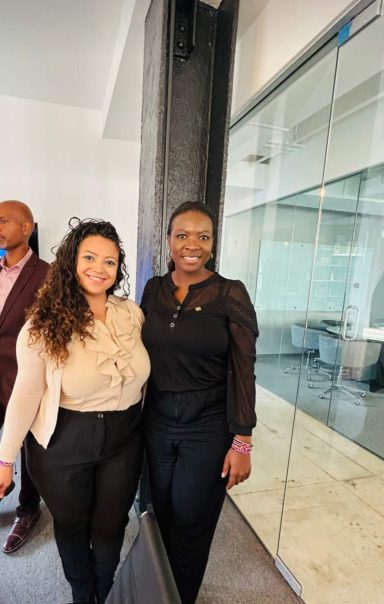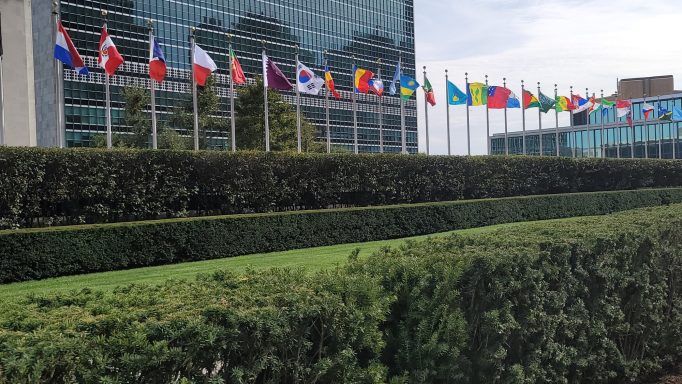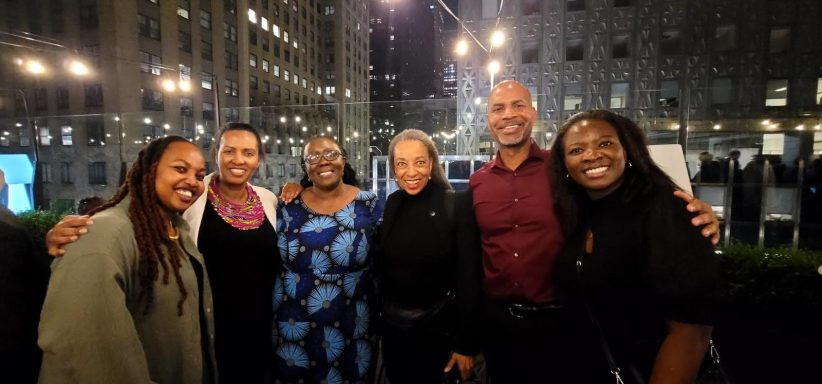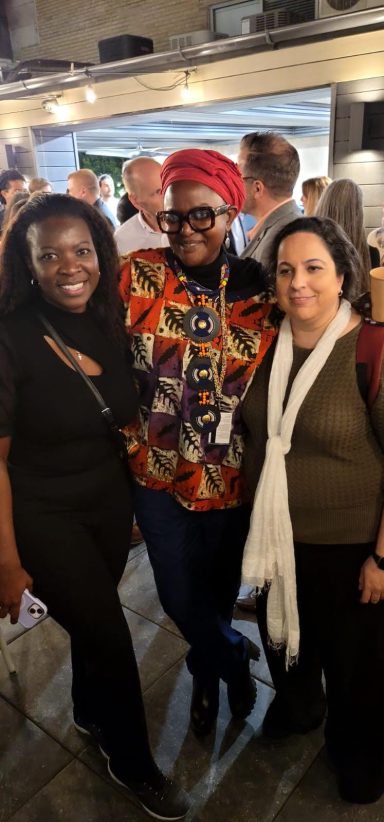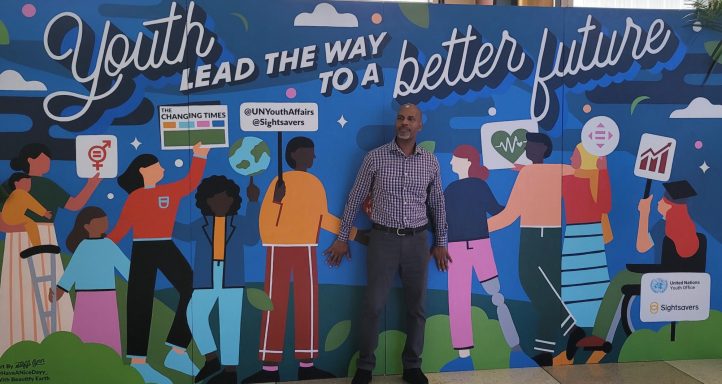Criminal Justice & Inequalities
In the Global Development Agenda Event
On September 19, 2024, ahead of the UN's Summit of the Future in New York City, Libra-Life International and Libra-Life Mentoring Services Inc. hosted an offsite panel event titled, Criminal Justice & Inequalities in the Global Development Agenda.
The event successfully highlighted the critical intersections of criminal justice and social inequalities, where diverse voices converged to address these pressing issues. The insights and strategies shared by esteemed panelists and the keynote speaker underscored the importance of continued dialogue and action, paving the way for a more just and equitable global society. The event addressed key issues related to criminal justice and social inequalities that aligns with the UN’s Sustainable Development Goals (SDGs).
Panelists included representatives from Oxfam International, the Prisoners’ Rights Project of The Legal Aid Society of the City of New York, SDG's Kenya Forum (Coalition for Sustainable Development), Clean Start Africa, Legal Resources Foundation (Haki Itawale), the 2024 United Nations Civil Society Conference, Raoul Wallenberg Institute, and Reed Strategies. The keynote address was delivered by the Presidential Advisor on Women’s Rights from the Republic of Kenya.
Interrogated were the intersections between SDG 16 on peace, justice, and strong institutions; and those on ending poverty (SDG 1); better health (SDG 3); decent work (SDG 8) gender equality (SDG 5) and inequalities (SDG 10) to reaffirm the principle of leave no one behind in the Global Development Agenda.

Understanding Criminal Justice Inequalities
Examining Systemic Disparities
Criminal justice inequalities involve disparities in treatment, influenced by race, socioeconomic status, and gender, and appear throughout the justice process, from arrests to parole decisions.

Empowering Voices for Change
Amplifying Voices for Justice
Empowering voices for change amplifies marginalized groups, challenging inequalities and driving reform. Providing platforms and resources helps communities advocate for their rights and achieve progress.

Your Role in Shaping the Future
Influence, Action, Progress
Your future is shaped by the choices and actions you take to address challenges and opportunities. Every effort, big or small, contributes to progress and inspires others.

Aligning Local Efforts with Global Goals
Connecting Communities to Solutions
Criminal justice inequalities, driven by race, class, and gender, affect arrests, sentencing, incarceration, and parole. These disparities erode trust and perpetuate poverty. Reform and proactive measures are needed for fairness and justice.
Meet Our Experts: Featured Speakers
Leading experts in criminal justice, social work, and global development. This was a unique opportunity to listen, learn, and participate in a dialogue that examined the pressing issues of inequality within our justice systems and actionable strategies to address them.

Carole Osero Ageng'o
Moderator
Carole Ageng'o is a seasoned lawyer and human rights advocate with 25+ years of experience managing programs on equality, gender, women’s rights, conflict, and law in Africa.
Carole leads HelpAge International’s Global Initiatives and serves as the Regional Representative for Africa. She is also Co-Chair of the 2024 UN Civil Society Conference in support of the Summit of the Future.
Before joining HelpAge, Carole was Associate Regional Director at Planned Parenthood Global, and previously worked at the Open Society Foundations and Equality Now. She has led successful policy advocacy initiatives at the African Union and the United Nations.

Stephanie Musho
Co-Moderator
Stephanie Musho is an international human rights lawyer.
She has 10 years experience working on gender and reproductive justice and in different capacities on projects for WHO, the Gates Foundation, the Graca Machel Trust, the END Fund, and the People’s Vaccine Alliance. She led advocacy and campaigns at Sharing Strategies on global architecture financial reform.
Steff is the Founder and Host of the Steff Musho Show, a leadership podcast featuring interviews with figures like President John Kufuor and Yvonne Chaka Chaka. She also hosted "The New Cold War," a 6-part series exposing tactics undermining sexual and reproductive rights in Kenya and beyond, impacting women, girls, and sexual minorities.

Hon. Harriette Chiggai
Keynote Speaker
Hon. Harriette Igonanga Chiggai is a prominent legal practitioner and an influential advocate for women’s rights in Kenya. She currently serves as the President’s Women’s Rights Advisor, where she leverages her extensive legal expertise and leadership skills to shape policies aimed at advancing gender equity and promoting women’s participation in leadership and procurement. Her multifaceted career also includes serving as the former Vice President of the Law Society of Kenya, underscoring her longstanding commitment to legal excellence and professional mentorship.
She is an iconic figure with wide leadership and professional experience. She has served in various institutions and Government Boards in Kenya and East Africa.

Deepak Xavier
Panelist: Global Strategic Impact Expert
Deepak Xavier is a senior strategic leader with over 20 years of national to global experience in leading organisations and people to create greater impact; and helping them grow their influence. He plays a crucial global role in advocating for social justice and addressing inequality. He has led Oxfam to become a leading global organisation on the fights against inequality.
Deepak heads Oxfam's Global Campaigns and Advocacy on several key issues including economic inequality, climate justice, taxation, public services and private sector accountability. He has helped co-found and nurture organisations and influential movements including the Fight Inequality Alliance, Centre for Budget and Governance Accountability, People’s Budget Initiative and the Global Organising School for Young Leaders.

Lenson Njogu OGW
Panelist: Decolonization and Declassification of Archaic Laws Expert
Lenson Njogu has 20 years of experience in human rights, rule of law, and governance, advising Kenya, Ghana, and Tanzania on policies. He serves on key committees, including the National Council on the Administration of Justice (NCAJ), contributing to justice sector reform.
A Certified Mediator for Kenya's Court Annexed Mediation, Lenson has advanced human rights within criminal justice, children's, and security sectors. He also worked with Haki FM Oasis of Justice to simplify legal information for underserved communities.
Lenson is an IVLP Alumni and an ABA-ROLI alumnus. He received the Order of the Grand Warrior (OGW) for his contributions to human rights and rule of law in Kenya.

Teresa Njoroge
Panelist: Criminal Justice Reform Expert
Teresa Njoroge founded Clean Start after being falsely accused, maliciously prosecuted and wrongfully imprisoned with her then 3-month-old daughter, a sentence she served at Lang’ata Women’s Prison. Her firsthand experience and the plight of women in prison together with their children inspired her to commit her life purpose to supporting millions of women and children leaving prison to to successfully reintegrate back to society.
She is the Convener of the Annual Beyond the Bars Conference that works towards the decriminalization of poverty and supporting successful reintegration. She is also the Founding Patron of the movement Sister on the Outside (SOTO) - a coalition of formerly incarcerated women in Africa.

Oswald Newbold, II
Panelist: Reentry & Reintegration Expert and Conflict Mediator
Oswald Newbold is a conflict mediator and reintegration expert dedicated to criminal justice reform, focusing on law enforcement bias, sentencing disparities, juvenile justice, corrections, reintegration, and peer mentoring to reduce recidivism.
He is President of the National Association of Reentry Professionals (NARP) and Reentry Coordinator at The Reentry Center of Riviera Beach, actively engaging in initiatives to address service gaps and support vulnerable, disenfranchised communities.
Oswald is a member of the Coalition for the UN We Need (C4UN). Also, he is the Founder and Executive Director of Libra-Life Mentoring Services Inc., doing business as Libra-Life International, the host of this event.

Damaris Seina OGW
Discussant: Corrections Expert
Damaris Seina is a corrections expert with 15+ years of experience in criminal justice reform across Africa, designing transformative prison programs in Kenya, Uganda, Tanzania, Burundi, South Sudan, Rwanda, and Zimbabwe to improve human rights for detainees.
Damaris specializes in legal and policy reforms, training justice actors, and assessing detention facilities to align with international human rights standards. She has trained thousands of prison staff in their practical application.
Her work has significantly improved prison systems and strengthened human rights protection within the criminal justice sector.

Florence Syevuo
Discussant: Expert in Social Justice Advocacy for Addressing Poverty and Inequality
Florence Syevuo is a leading Civil Society Coalition Builder and Campaigner focused on ending poverty and inequalities. She began her work as a coordinator and youth champion for the Millennium Development Goals in 2006, partnering with the Ministry of Devolution and Planning and the United Nations Millennium Campaign. In 2016, she became the Country Coordinator for the SDGs Kenya Forum, promoting a unified approach to implementing the 2030 Agenda in Kenya.
Florence has played a key role in policy advocacy, research, and mass citizen mobilization. She has facilitated civil society engagement with government, private sector, academia, and media to accelerate progress on sustainable development in Kenya.

Louis L. Reed
Panelist: Social Impact Expert in Government, Criminal Justice, Policy, and Health
Louis Reed is a social impact leader in criminal justice reform, policy advocacy, and public health. After nearly 14 years in federal prison, his efforts led to the passage of over 30 bills, including the First Step Act, benefiting over 650,000 individuals.
He is Executive Vice President of the Douglass Project for Justice, focused on reducing recidivism and supporting reentry. Reed previously led strategic partnerships at REFORM Alliance and founded Connecticut's first government-based reentry office.
Reed is also the founder of Decoded: Story Lab, an award-winning author, and a commentator on the Law & Crime Network. He consults on criminal justice reform and appears in First Step on Amazon and UnPrisoned on Hulu.

Mary Lynne Werlwas
Panelist: Prisoner's Rights Expert
Mary Lynne Werlwas is the Director of the Prisoners' Rights Project at The Legal Aid Society of the City of New York. The Prisoners' Rights Project challenges constitutional violations and unlawful conditions in jails and prisons in New York. Previously, she was an associate at Altshuler, Berzon, Nussbaum, Rubin & Demain in San Francisco, specializing in labor, employment, constitutional, and civil rights law, and a fellow at Human Rights Watch in New York. She also served as a law clerk to the late Honorable Richard D. Cudahy of the United States Court of Appeals for the Seventh Circuit and to the Honorable Chief Justice Gubbay of the Supreme Court of Zimbabwe in Harare. She is a graduate of Princeton University and Columbia Law School, where she was a Harlan Fiske Stone Scholar and Articles Editor of the Columbia Law Review.
Explore Our Event Gallery
Explore photos from past events hosted by Libra-Life International. These images showcase the enthusiasm and commitment of attendees working on criminal justice and inequality issues. Each photo narrates our collaborative efforts and community engagement, highlighting our ongoing mission to drive societal change. Join us on this visual tour of our impactful events.
The Untold Story of the Disenfranchised
In Global Development
An often-sidelined constituency in global development are incarcerated and formerly incarcerated people who are relegated to the periphery of international global development discourse. Where included, they are combined with a wide range of ‘marginalized groups’ which does not address their unique issues. Instead, it perpetuates their exclusion and discrimination in decision making processes.
Consider that there are over 2 million incarcerated people in the United States of America alone. This is the highest number of prisoners in the world per country. It is larger than the population of Bahrain or Djibouti. In fact, this statistic is higher than the combined population of the world’s 10 least populated countries. Notwithstanding, crime rates have reduced over the past 3 decades, yet the rates of imprisonment continue to increase with longer sentences. There is due disregard of culpability versus harm, and mitigating factors while sentencing, in fact studies have established that criminal trial and sentencing processes are skewed against the poor and the marginalised.
Globally, 11.2 million people are held in prisons; whose conditions fall short of the commitments contained in the United Nations Standard Minimum Rules for the Treatment of Prisoners (the Nelson Mandela Rules), which recommend that
“Member States continue to endeavour to reduce prison overcrowding and, where appropriate, resort to non-custodial measures as alternatives to pretrial detention, to promote increased access to justice and legal defence mechanisms, to reinforce alternatives to imprisonment and to support rehabilitation and social reintegration programmes”
Presumption Against Incarceration: The Havana Rules advocate for alternatives to incarceration whenever possible. They emphasize that detention should only be used as a last resort and for the shortest appropriate period. This principle is rooted in the understanding that incarceration can have detrimental effects on young people’s development and future prospects. Conditions of Detention: When incarceration is deemed necessary, the Havana Rules stipulate that conditions must be humane and conducive to rehabilitation. This includes providing access to education, vocational training, and recreational activities. The environment should be structured to support personal development rather than punitive measures. In summary, the Havana Rules advocate for a juvenile justice system that prioritizes rehabilitation over punishment, emphasizes humane treatment during incarceration, ensures legal protections for minors, focuses on reintegration into society, and promotes regular oversight of juvenile facilities.
The Bangkok Rules represent a significant step towards recognizing the unique challenges faced by incarcerated women and girls by promoting humane treatment, healthcare access, family connections, non-custodial alternatives, gender sensitivity among staff, and supportive reintegration strategies.
Moreover, the number of unsentenced prisoners continues to rise. This raises concerns about gaps in access to justice.
The current system results in deleterious outcomes. These include declining physical and mental health; physical abuse including sexual violence. Economically, upon release, formerly incarcerated individuals face systemic obstacles in obtaining certificate of clearance (certificate of good conduct), sustainable incomes, affordable housing, and societal acceptance. Post-incarceration life is burdened with collateral consequences rooted in stigmatization and marginalization, leading to social ostracization. Failing to reintegrate successfully, some individuals succumb to recidivism.
There must be an ongoing push to interrogate the intersections between SDG 16 on peace, justice, and strong institutions; and those on ending poverty (SDG 1); health (SDG 3); decent work (SDG 8) Gender Equality (SDG 5)and inequalities (SDG 10) to reaffirm the principle of leave no one behind in the global development agenda.
Targeted Outcomes
- Deskewing the criminal justice system against the poor.
- A strong and positive narrative that breaks the stigma and advances the rights of incarcerated and formerly incarcerated individuals; and their participation in decision making processes at all levels.
- Clear proposals on intersectional collaboration and partnerships for SDG 16 (peace, justice and strong institutions)
Guiding Themes
- Poverty & Inequality
- Inclusion: Re-entry of system impacted individuals
- Law reform: Decolonization and declassification of archaic laws; including deskewing the CJS Processes
- Governance and accountability: Law enforcement and judicial officers
- Human Rights
- Intersectional approaches

Please Read...
The Pact for the Future Must Include the Unique Needs of Incarcerated and Formerly Incarcerated Persons
View the video discussion featuring the
co-authors of "Breaking Chains, Building Futures"
Check out the co-authors of the book, Breaking Chains, Building Futures: Pathways to Redemption, Education, and Excellence, give a collection of impactful personal accounts. The discussion is centered on the intersection of incarceration and education, highlighting the profound impact that learning can have on rehabilitation and reintegration. The co-authors shed light on the systemic importance of unlocking higher education for an often-overlooked population, which is incarcerated and formerly incarcerated individuals. Whether it be man, woman, or child.

